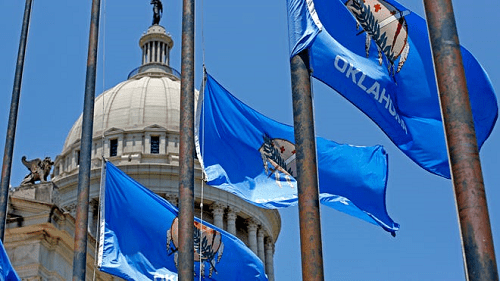
10.25.21 – The Oklahoman –
More than 350 new laws passed by the Oklahoma Legislature and approved by Gov. Kevin Stitt will take effect at the beginning of November.
More than 350 new Oklahoma laws take effect Nov. 1.
From education changes to medical marijuana reforms and naming a state highway after a controversial former president, Oklahoma’s new laws run the gamut.
Here are the highlights:
Cracking down on doxxing
Oklahoma will make it illegal to publish the personal information of law enforcement officers or public officials with the intent to “threaten, intimidate or harass,” a practice commonly known as doxxing.
A person could be charged with a misdemeanor if an officer or public official has a “reasonable fear of death or serious bodily injury” due to the release of personal information, such as their birth date, address, Social Security number, or other medical, financial or employment information.
Civics test and more changes at schools impacting education
Starting in the 2022-23 school year, Oklahoma high school students will be required to pass a civics test with questions drawn from the U.S. naturalization exam in order to graduate. Students will have to score 60% or higher on the 100-question test that will pluck government and history questions from the test given to those seeking to become U.S. citizens.
Also by next school year, all schools will be required to include mental health instruction in any health education curriculum. Under House Bill 1568, the State Board of Education will develop a list of mental health resources for students and revise the state’s academic standards to include mental health.
By the 2024-25 school year, all public and charter high schools will be required to offer students at least one computer science course, according to Senate Bill 252 that takes effect next month. Your stories live here.Fuel your hometown passion and plug into the stories that define it.Create Account
On the higher education side, a new law creates the “Oklahoma Student Borrower’s Bill of Rights” that seeks to prevent predatory student loan practices and establish basic state protections for student loan borrowers.
Education tax credits
As part of the state budget deal in the spring, Oklahoma’s GOP-led Legislature made a tenfold increase in the tax credits allowed under the Equal Opportunity Education Scholarship Act.
A new law raises the tax credit cap from $5 million to $50 million for donations to schools. Public and private schools will each have a $25 million cap on tax credits.
‘President Donald J. Trump Highway’
Oklahoma soon will have a roughly 20-mile stretch of highway in the panhandle named after former president Donald Trump.

The “President Donald J. Trump Highway” will be a section of U.S. 287 that stretches from Boise City to the Oklahoma-Texas border in Cimarron County.
The legislation backed by GOP lawmakers also names a Midwest City interchange after U.S. Sen. Jim Inhofe, Oklahoma’s senior senator.
Another new law allows elected officials to use their campaign funds to cover the costs of signage for naming memorial highways and bridges.
New medical marijuana laws
Local dispensaries soon will be able to offer cannabis samples, although not in the traditional sense.
Medical marijuana patients will be able to touch and sniff various cannabis strains at dispensaries so long as those samples are for display purposes only and not sold to customers.

House Bill 2646 also gives dispensaries more options to sell pre-rolled joints. Existing law says only licensed processors can roll and package marijuana cigarettes, but starting next month, dispensaries will be able to make their own in-house.
In addition, HB 2646 allows the Oklahoma Medical Marijuana Authority to inspect cannabis businesses twice a year and make changes to product testing requirements.
Caps on insulin costs
As a national debate rages about the costs of insulin, a drug roughly half a million, Oklahomans with diabetes rely on, lawmakers capped the copay costs for insulin prescriptions.
House Bill 1019 caps the copay for a 30-day supply of insulin at $30 and a 90-day supply of insulin at $90.
In a similar vein, the new “Transparency in Health Care Prices Act” will require Oklahoma health care providers to publicize on their website or in a publicly available document the prices of the 20 most common services they offer.
Ida’s law: Missing and murdered Indigenous Oklahomans
Ida’s Law is the first step toward Oklahoma getting an office that would work with state, tribal and federal law enforcement agencies on missing persons and homicide cases involving Native Americans.
The law directs the Oklahoma State Bureau of Investigation to work with the Justice Department to secure federal funding for an Office of Liaison for Missing and Murdered Indigenous Persons.

For years, local tribal members have tried to reduce violent crime targeting Native Americans and increase transparency around the number of Indigenous citizens that go missing.
The new law is named after Ida Beard, a local member of the Cheyenne and Arapaho Tribes who has been missing since 2015.
Local law enforcement legally required to comply with ICE detainers
After the Oklahoma County jail under former Sheriff P.D. Taylor declined to honor immigration detainer requests, a new law will require all law enforcement agencies, sheriffs and jails to comply with U.S. Immigration and Customs Enforcement Agency requests to hold an inmate for an extra 48 hours in some instances.
The detainer requests, which some say are unconstitutional, give ICE agents more time to take an inmate into federal custody if they believe that person violated federal immigration laws or their citizenship status is in question.
Medical parole reforms
More medically frail and elderly prisoners could qualify for parole under a new law.
Senate Bill 320 will broaden the definition of medical parole, also known as compassionate release, to include those who are medically vulnerable and those with a medical condition that can make it hard to care for themselves.
Currently, medical parole is only allowed for prisoners who are near death or dying. Medical parole requests will still go before the Pardon and Parole Board for review.
Oklahoma’s State Pet
Soon, Oklahoma law will encourage residents to adopt, don’t shop when it comes to picking out a furry friend.
The rescue animal will be the state pet of Oklahoma thanks to “Cali’s Law,” which is named after Republican Rep. Mark McBride’s 80-pound Catahoula mixed-breed dog.
‘Oklahoma Religious Freedom Act’
A new law aims to deter government entities from closing houses of worship after the issue became a flashpoint during the COVID-19 pandemic.
The law from Rep. Brian Hill, R-Mustang, and Sen. David Bullard, R-Durant, stipulates the forced closure of places of worship amounts to a “substantial burden” on a person’s right to religious freedom.
‘No Patient Left Alone Act’
Another new law stemming from the COVID-19 pandemic requires hospitals to allow patients to have at least one visitor, even if Oklahoma is under a state of emergency.
The bill’s author, Rep. Toni Hasenbeck, R-Elgin, said she introduced the legislation because many hospitals prohibited visitors as a safety precaution during the height of the COVID-19 pandemic.
“Adding isolation on top of health struggles drastically affects the patient’s mental health, and many people died without getting to see their family or friends one last time,” she said in a news release.
State law still allows hospitals to limit visitors in some situations. Hospitals can also require visitors to don personal protective equipment and follow reasonable safety protocols.
Self-pour beer and wine in Oklahoma
A new nightlife trend is bars that allow patrons to serve themselves beer and wine from automated machines.
The concept allows patrons to try smaller pours of a wider variety of adult beverages.
House Bill 2380 legalizes the practice in Oklahoma. The legislation comes after Crave Hot Dogs & BBQ in Yukon became the first Oklahoma business to offer self-pour brews.
Helping inmates to rejoin society
A new law requires the Oklahoma Department of Corrections to help inmates obtain a state-issued identification card or driver’s license upon their release from prison.
Prior to their release, the agency will identify which inmates will need an ID card and help them gather the documentation needed for the Department of Public Safety to issue a card.
The law is named the “Sarah Stitt Act” because the changes were championed by Oklahoma’s First Lady.

Universal licensing for skilled workers who move to Oklahoma
The “Universal Licensing Recognition Act” will make it easier for Oklahoma to honor professional licenses and certifications granted by other states.
The law aims to cut through bureaucratic red tape to allow skilled workers who move to Oklahoma and are in good standing in their field to continue working without having to obtain a new license.
Many workers, including electricians, plumbers and nurses, have to be licensed to work in Oklahoma. Getting licensed can require mandatory training, apprenticeship hours, taking a state exam and paying associated fees.
New gun laws
A new law will allow bar employees to carry a firearm while at work so long as they have permission from the business owner.
Senate Bill 646 also adds liquor stores to a list of businesses that can regulate weapons on their property.
Changes to state question process
Two new laws will alter the state question process by which citizens can push for a statewide vote on an issue.
In some situations, Oklahoma will allow for the recount of votes on state questions. Previously, the results could not be subject to a recount.
Proposed state questions that increase the cost of government will also have to include a fiscal impact statement, a new requirement.
Protections for victims of domestic violence, sexual violence
A new law allows victims of domestic violence to terminate a rental lease early without facing financial penalties.
Senate Bill 200 allows victims of domestic violence, stalking or sexual violence to terminate a lease without being financially penalized by providing written notice and a copy of a protective order within 30 days of a violent incident. It also prohibits landlords from refusing to rent to a tenant because they’ve previously terminated a rental agreement due to violence from an intimate partner.
Another new law also protects the rights of sexual assault victims, regardless of if they participate in a forensic medical evaluation or a criminal investigation of their assault. The “Sexual Assault Victims’ Right to Information Act” allows a victim advocate to be present for a sexual assault examination and expands protections for victims.
Anti-abortion laws
Whether three new anti-abortion laws will take effect Nov. 1 is still up in the air due to litigation.
Reproductive rights groups are asking the Oklahoma Supreme Court to prevent three anti-abortion laws from taking effect while the courts weigh the constitutionality of the measures.
Two new laws would restrict medication abortions and one would limit who could perform abortions, effectively reducing the number of health care professionals that can perform the procedure.
An Oklahoma County District judge already put on hold two other anti-abortion laws pending the outcome of ongoing litigation.
